Sharing our knowledge
The Climate Action Beacon and affiliated research schools, centres and institutes across Griffith University are committed to sharing our climate action research and insights as widely as possibly. Through international collaboration and research, we review comparative approaches, share innovations, and develop international best practice on tackling climate action (SDG 13). Explore the commentary, publications and links to networks below, as well as some of the tools developed to assist decision making and systems change in relation to climate adaptation
Sustainable Development Goals
Griffith University is aligned with the United Nation’s Sustainable Development Goals (SDGs) and is committed to taking action on climate change and strengthening global partnerships to address this issue, collaborating on innovative solutions for a sustainable and resilient future.
International best practice: Resources, tools, networks, and research

EcoCommons
EcoCommons is building a world-first collaborative commons that will become the platform of choice for analysing and modelling ecological and environmental challenges. Commencing in 2020 and ongoing throughout 2024, EcoCommons has been funded by a $5 million investment from nine partner institutions. It is transforming ecological and environmental research by creating a trusted, single platform for digital modelling and analysis needs that can inform international best practice for climate action. EcoCommons also aims to facilitate best practice modelling and reviews across many scientific domains and jurisdictions, drawing from thousands of datasets.
A 2025 article in Environmental Modelling and Software highlights how EcoCommons was designed to empower researchers and policymakers with accessible, trusted modelling tools that streamline complex ecological analyses. It provides access to national and global trusted datasets, advanced modelling tools, and training resources. This makes EcoCommons a valuable resource for ecological research both within Australia and in broader international contexts.
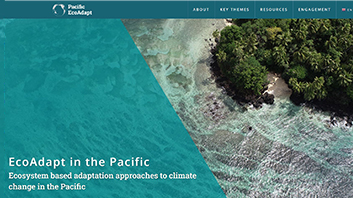
EcoAdapt in the Pacific
The Pacific EcoAdapt Program is an initiative of the Climate Action Beacon in collaboration with the Tafea Provincial Government, National government agencies, the University of South Pacific, local communities, and other stakeholders. Focusing on Vanuatu as a case study, the program of research aims to generate new knowledge at the local level to better understand the interactions of the physical, ecological, social, cultural, economic, policy and governance activities and factors that shape communities' ability to adapt to climate change. Through partnership with local and national government agencies and organisations, the research is supporting better planning and decision-making in the coastal zone.

Advancing global best practice in climate-sensitive disease prevention
Through international collaboration and research, Griffith University’s 2023-2028 E-Dengue project is helping shape global best practice in tackling climate-sensitive infectious diseases. Focused on the Mekong Delta region in Vietnam, the project brings together experts from across the Asia-Pacific to develop and embed digital prediction tools that support early warning and proactive public health responses to diseases like dengue, malaria and cholera. Using a 3-U framework (useful, usable, used), the team is working to ensure these tools are not only scientifically robust but also practical and sustainable within local health systems, contributing to more resilient communities and informed global policy.
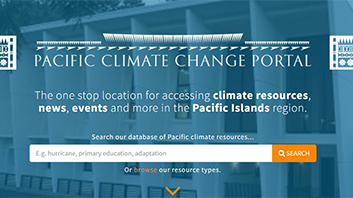
Pacific Climate Change Portal
The Pacific iCLIM project was a collaboration between the Secretariat of the Pacific Regional Environment Programme (SPREP) and Griffith University, supporting climate change resilience and adaptation planning in the Pacific by improving the discoverability, storage, access, and utilisation of climate change data and information. Since 2014 Griffith University has worked alongside SPREP to assist its Pacific island member states to access and share data and information via the Pacific Climate Change Portal. This is an ongoing project. Improvements/updates to the Portal were undertaken during the DFAT funded Climate and Oceans Support Program in the Pacific 2018-2022. During 2023 and 2024, the portal has formed part of the Bureau of Meteorology's (BOM) contributions to the WMO RA-V Pacific Regional Climate Centre Network as Consortium member for the Node on Climate Monitoring.
Go to Pacific Climate Change Portal Discover how the BOM has been using the Portal since 2023
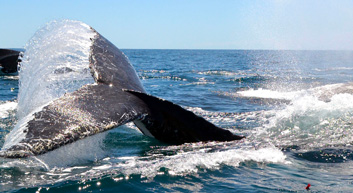
Whales and climate: Australia, South Africa and South America
Many whale populations are now in the process of recovering following over- exploitation by the whaling industry. Climate change is the next big challenge that whales are facing. It includes a multidisciplinary and international team from Australia, South Africa and South America to address this problem. Through international collaboration and research, this project seeks to develop international best practice to support whale conservation.
Through a comparative review of the literature and data collection with, and observation of, whales, this 2018-2026 research program establishes a fundamental understanding of how changing ocean conditions are influencing the recovery of humpback whale populations. It involves developing adaptation scenarios to inform best practice whale conservation, policies and programs. The project will also lead to improved understanding of the role whales might play as carbon sinks and thus climate engineers, and their role as ecosystem engineers contributing to ocean productivity. Further, it will lay the path for future research on other baleen species.
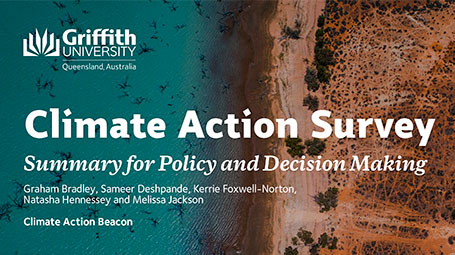
Climate Action Survey
The National Climate Action Survey is a flagship research initiative of Griffith University’s Climate Action Beacon, conducted annually since 2021 and, from 2025, will be completed in partnership with the Monash Climate Change Communication Hub. The survey provides one of the most comprehensive longitudinal datasets on Australians’ attitudes, beliefs, and behaviours related to climate change. Each year, thousands of Australians participate, offering insights into how public sentiment is shifting in response to climate events, policy debates, and social trends. The findings inform climate policy, public engagement strategies, and interdisciplinary research, supporting evidence-based action across government, industry and community. The survey’s reports and technical summaries are publicly available and contribute to Griffith’s leadership in climate communication and just transitions.

Interactive Landscape and Ecosystem Connectivity Map
Between 2022 and 2024, Griffith University researchers partnered with the Great Eastern Ranges and Gondwana Link to develop a cutting-edge decision support tool that is transforming how wildlife corridor projects are planned across Australia. Designed to help conservation practitioners identify optimal connectivity pathways, the tool uses advanced modelling to map millions of linkages between habitats, factoring in forest maturity, environmental variables and human pressures. By enabling users to pinpoint critical movement corridors and connectivity bottlenecks, the tool supports more strategic restoration and protection efforts. It also contributes to international best practice on SDG 13 - Climate Action, by helping mitigate biodiversity loss and climate impacts through nature-based solutions that enhance landscape resilience and carbon sequestration.

Supporting climate-resilient land and sea management
The Adapt Land and Sea project (2024–2026) is creating a knowledge platform to help land and sea managers plan for climate adaptation. Led by Professor Brendan Mackey (Griffith University) and Dr Jenny Styger (University of Tasmania), the project brings together climate data, case studies and tools to support evidence-based conservation decisions. By embedding climate considerations into everyday practice, it contributes to international best practice on SDG 13 - Climate Action.
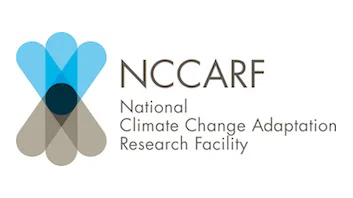
National Climate Change Adaptation Research Facility
Since 2020 the National Climate Change Adaptation Research Facility (NCCARF) have partnered with the Climate Action Beacon. NCCARF was a unique venture established by the Australian Government to harness and coordinate the capabilities of Australia’s researchers, to generate and communicate the knowledge decision-makers need for successful adaptation to climate change. NCCARF has created numerous resources to help meet SDG 13 and promote climate change adaptation, including over 150 research reports and comparative reviews, more than 80 case studies, 17 policy information, best practice and guidance briefs, as well as webinars, synthesis summaries, sector-specific briefing notes, and many others. In addition to publications, NCCARF has also set up, collaborated and supported national climate change adaptation networks, built a nation-wide website with countless resources of its own and held six national and international conferences.
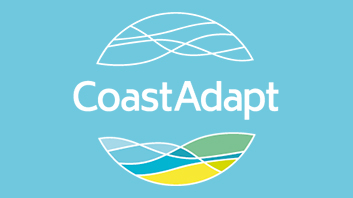
CoastAdapt
CoastAdapt is an information delivery and decision support framework hosted by the National Climate Change Adaptation Research Facility which has now partnered with the Climate Action Beacon. It is for anyone with an interest in Australia’s coast, the risks it faces from climate change and sea-level rise, and what can be done to respond to those risks. CoastAdapt contains information and guidance to help people from all walks of life understand climate change and the best practice responses available to manage the impacts.
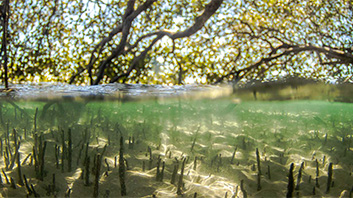
GLOW
The world needs coastal wetlands. Seagrass meadows, mangrove forests and saltmarshes are high-value habitats providing many benefits to humanity. Unfortunately, we’re losing these important places. There’s an urgent need to limit and reverse the loss of coastal wetlands in order to arrest biodiversity decline, protect communities and tackle climate change. The Global Wetlands Project (GLOW) is based on an international collaboration between Griffith University and the Chinese University of Hong Kong which seeks to elevate scientific understanding of critical issues facing coastal wetlands, reviews and identifies methods for conserving mangroves, and builds online tools to help address these issues and contribute to the attainment of SDGs 13, 14, and 15. GLOW is an ongoing project, which was first established in 2018 and is continuing throughout 2024.
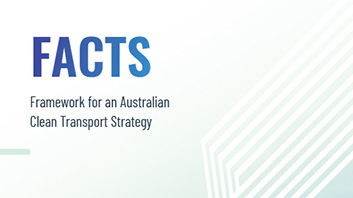
A Framework for an Australian Clean Transport Strategy (FACTS)
A Framework for an Australian Clean Transport Strategy (FACTS) has been developed by 18 clean transport and energy experts, including Dr Emma Whittlesea and Prof Tim Ryley of Griffith University. FACTS was developed to enable and boost cooperative action across federal, state/territory, and local governments, together with industry, to support the decarbonisation of Australia’s transport sector, and in turn, support the uptake of low and zero emission transport technologies and strategies.
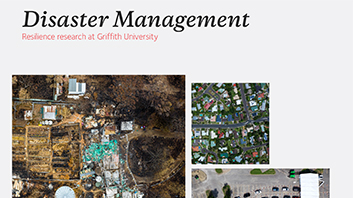
Disaster Management - Resilience research
Griffith University's applied interdisciplinary research tackles some of the world's most pressing challenges, delivering tailored decision-support solutions to help communities successfully manage threats from bushfires, extreme weather events, including floods and heatwaves, water security and the COVID-19 pandemic. The University's state-of-the-art facilities are designed to enable improved disaster management and resilience decision support for research and scenario planning, as well as activation training for disaster response and recovery.

Climate change risk management tools
The National Climate Adaptation Research Facility which has now partnered with the Climate Action Beacon, was delighted to have been involved in the development of important climate risk management tools released by the Queensland Government. The new tools have been developed to help households and small businesses identify and manage climate change risks. The tools contain information on climate change, checklists to assess associated risks and links to other resources. In taking these first steps, households and small businesses can improve their awareness of future risks and be better prepared to respond to present day weather extremes.
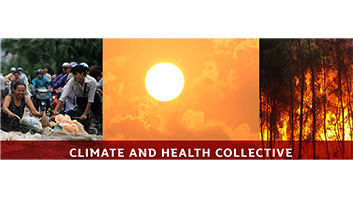
Climate and Health Collective
Our collective, which we joined in 2023, strives to build an inter-disciplinary network of research expertise in climate change and health within Griffith University, with the purpose of identifying, understanding and responding to critical climate-related health problems and collaborating for climate action best practice. Our researchers span the field of social sciences, systems thinking and modelling, environmental epidemiology, sustainable business and management, public and environmental health, governance and policy development, psychology, and sociology. We are working together with communities – locally and globally – to solve and respond to complex factors that exacerbate the health risks of climate change and develop best practice for tackling the SDGs, with a particular focus on SDG 13 and SDG 3.
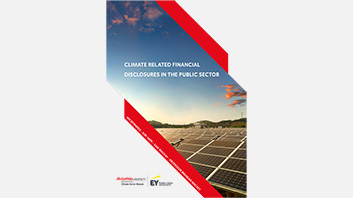
Climate Related Financial Disclosures in the Public Sector
The Griffith Climate Action Beacon and EY produced a report examining the application of the Task Force on Climate-related Financial Disclosures (TCFD) to the public sector. The TCFD was established in 2015 by the G20's Financial Stability Board on the premise that more complete and consistent disclosure of climate-related risks would encourage better risk management by entities, resulting in a more stable financial system. Though predominantly targeted at the private sector, there is growing interest in the relevance of the TCFD framework for guiding public sector climate action.
Download the Climate Related Financial Disclosure in the Public Sector Report

The Pacific Hub - Griffith Asia Institute
The Pacific Hub adds to the established profile of the Griffith Asia Institute by providing a suite of activities, including research, events, reviews, commentary, and professional services, focused on the Pacific islands region. It was established in 2020 and has been ongoing throughout 2024 and 2025. It offers the latest commentary on Asia-Pacific affairs and aims to inform and foster academic scholarship, public awareness and considered and responsive policy making.
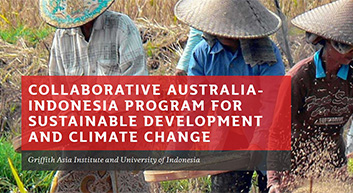
Collaborative Australia-Indonesia Program
The Collaborative Australia-Indonesia Program for Sustainable Development and Climate Change was launched to realise Griffith University's commitment in engaging with Indonesia through a strategic and mutually beneficial way. The bilateral Program brings together expertise and coordinates opportunities across the two nations with the focus on sustainable development and climate change.

Terra Nova including SEQ CARI
Terra Nova is an Australian Climate Change Adaptation Information Hub. It exists to support more effective climate change adaptation research and responses by improving the accessibility and availability of climate change adaptation data and information. Terra Nova includes the South East Queensland Climate Adaptation Research Initiative (SEQ CARI) which was the first comprehensive regional study of climate change adaptation for human settlements in Australia, and one of just a few worldwide.
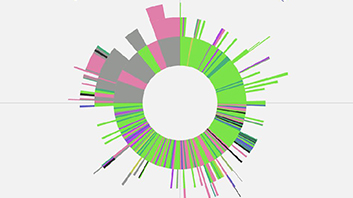
The EcoRegime Map
The EcoRegime Map is an initiative of the research project -Valuing Nature: Ecosystem Services for Sustainable Development and a Green Economy. It maps the global governance field for ecosystem services, with the aim of understanding which international and transnational actors are using the concept of ecosystem services; and whether and how international use of the ecosystem services concept has changed over time.
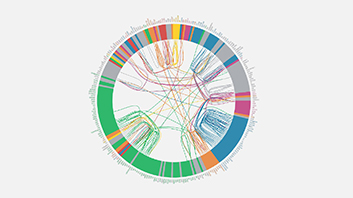
The Climate Regime Map
The Climate Regime Map is an interactive 'map' of the international climate change governance regime being developed by the Institute for Ethics, Governance and Law at Griffith University. The tool is being designed to enable stakeholders to visually explore all the components, legal instruments, entities and processes involved in the ongoing climate change negotiations and how these propagate down to the national level. This comprehensive overview is a world's first and in addition to its research applications it will be of practical value to government negotiators and the NGO stakeholders.